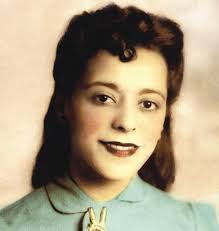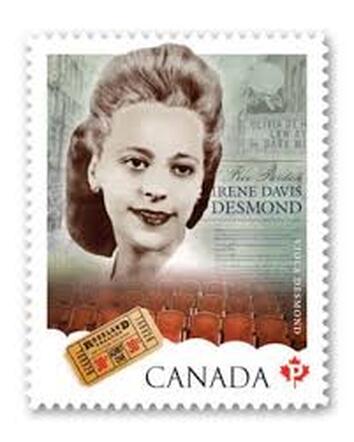|
On July 6, 1914, Viola Irene Davis was born in Halifax, Nova Scotia, as one of ten children to parents James Albert and Gwendolin Irene Davis. James was a barber and Gwendolin was a homemaker; Gwendolin was seen as an uncommon woman, she was a white woman who made a family with a black man and she was active in fighting for black rights. As a young girl Viola wanted to be a hairdresser, she also noticed a need for black hair care and beauty products in Nova Scotia. Racism in Canada was prevalent and would deny Viola her human right to attend beauty schools in Halifax, Nova Scotia. Determined to get the training she needed, she moved to Montreal to attend the Field Beauty Culture School, before attending beauty school in Atlantic City, New Jersey, and New York City; in New York, she was able to develop her skills attending one of Madame C.J. Walker's beauty schools. She would complete her training and earned her diploma from the Apex College of Beauty Culture and Hairdressing in Atlantic City, New Jersey. After completing her beautician training, Viola returned to Halifax where she opened her own beauty salon in 1937 to served black clients. Her salon was very popular and even attracted notable black Canadian women such as opera singer Portia White and Nova Scotia’s first black nurse Gwen Jenkins. Returning to Halifax also afforded Viola the chance to meet and Mary a man named Jack Desmond, who was integral in helping her become a successful businesswoman. Viola drew from her own experience as an aspiring beautician, she remembered the discrimination she faced and didn’t want any other black women to face discrimination, so the Desmond School of Beauty and Culture was created to serve and educate the future of black women beauticians. Viola Desmond was truly standing on the shoulders of black hair care pioneers Annie Malone and Madame C.J. Walker. Annually the Desmond School of Beauty and Culture would graduate up to fifteen women fully equipped as master beauticians and business women. Black women from all over Canada and parts of the United States attended Viola's school. Black women who were rejected by white-run beautician schools found a place at the Desmond School of Beauty and Culture. Entrepreneurship was in Viola's blood and professional training, so it was no surprise that she created her own line of beauty products, VI’s Beauty Products. Later in her entrepreneurial journey, Viola and her husband Jack joined forces and opened a beauty and barber salon to serve the black men and women of Halifax. Viola Desmond became a notable woman within the communities of Halifax, but her success would not shield her from the ongoing racism experienced in Canada. In 1946, Viola took a business trip to New Glasgow, Nova Scotia to sell her beauty products. She was experiencing car trouble and took her car to be repaired, informed that it would take a day to fix her car she decided to see the movie “The Dark Mirror” at the Roseland Theater. Unaware that the theater was segregated she proceeded to sit on the main floor instead of the balcony that was reserved for black patrons. Viola was said to be nearsighted and sat in the main floor section so she can see; she was also sold a ticket designated for the balcony; tickets for black moviegoers were taxed higher than tickets for white moviegoers. The manager of the theater quickly demanded that Viola leave the main floor and sit in the balcony. She refused to move because she could actually see the screen from her main floor seat. The theater called the police and Viola was removed from the main floor by physical force and injured in the process. For her refusal to leave the “white section” she was arrested and charged with tax evasion; it was a one cent difference in tax between black and white movie tickets. Viola was forced to pay a twenty dollar fine along with six dollars in court fees to be released from jail. After her release from jail, Viola and her husband discussed her arrest, he attempted to encourage her to drop the matter and move on with her life, encouraged by her minister she followed her heart and took the case to court to claim her justice. Black Canadian journalist Carrie Best wrote about Viola’s case in The Clariton which was a black-owned Canadian newspaper. The story running in the newspaper helped the case to gain momentum and support; the Nova Scotia Association for the Advancement of Colored People (NSAACP) learned of her case and decided to help her fight the case. Viola was able to hire Frederick William Bissett as her lawyer but was unsuccessful in filing a lawsuit against the theatre. Tax evasion was the crime that the Canadian government was set on charging Viola Desmond with, even though Viola tried to buy a main floor ticket, but they were not sold to black patrons. The language of the Nova Scotian statues did not help Frederick Bissett’s argument against tax evasion; many people believed that he failed her as a lawyer for trying to argue the tax evasion angle instead of the angle of racial discrimination. Even though Bissett was unsuccessful in his defense of Viola Desmond he did not charge her for his services, the money he would have charged her was used to support the Nova Scotia Association for the Advancement of Colored People (NSAACP), which was in its infancy stage. Following her loss in her trial, she closed her business and moved to Montreal, Canada and enrolled into Business College. Later she would settle in New York City before she died of gastrointestinal hemorrhage in 1965. In 2010, Viola was pardoned posthumously by the Lieutenant Governor of Nova Scotia for her wrongful arrest and conviction in the movie theatre. Though Viola Desmond was no longer with us physically her legacy was set; a scholarship was created in her name at Cape Breton University. In 2012, her likeness was displayed on a commemorative Canadian stamp. In 2016, a Halifax Harbor ferry was named and her name was included in her honor. In December of 2016, her likeness was chosen to appear on the Canadian ten-dollar note. In January of 2018 she was named a National Historic Person, and June of 2018 she was given a star on Canada’s Walk of Fame. She was an outside-the-box thinker and black Canadian pioneer, she was not afraid to face Canada's racist systems even if it was not a planned event. She created the black hair care industry in Canada while creating opportunities for other black people to succeed. Mrs. Viola Irene Desmond, we proudly stand on your shoulders. J.A. Ward Click here to support our On the Shoulders of Giants African history book series!! References:
https://www.thoughtco.com/viola-desmond-biography-4120764 https://en.wikipedia.org/wiki/Viola_Desmond https://www.blackpast.org/global-african-history/desmond-viola-davis-1914-1965/
1 Comment
Lynn
6/18/2019 01:47:09 am
Another wonderful history lesson.
Reply
Leave a Reply. |
Details
Categories
All
Click Here to join our mailing list
|
Contact Us: |
Connect With Us |
Site powered by PIT Web Design



 RSS Feed
RSS Feed



